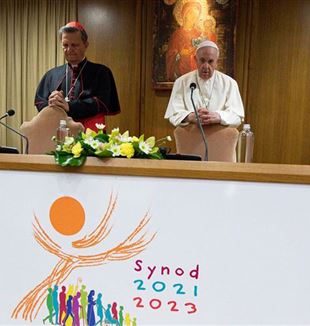
"The protagonist of the Synod is the Holy Spirit"
Pope Francis' address during the moment of reflection for the opening of the synod. "Enabling everyone to participate is an essential ecclesial duty!"Dear brothers and sisters,
Thank you for being here for the opening of the Synod. You have come by many different roads and from different Churches, each bearing your own questions and hopes. I am certain the Spirit will guide us and give us the grace to move forward together, to listen to one another and to embark on a discernment of the times in which we are living, in solidarity with the struggles and aspirations of all humanity. I want to say again that the Synod is not a parliament or an opinion poll; the Synod is an ecclesial event and its protagonist is the Holy Spirit. If the Spirit is not present, there will be no Synod.
May we experience this Synod in the spirit of Jesus’ fervent prayer to the Father on behalf of his disciples: “that they may all be one” (Jn 17:21). This is what we are called to: unity, communion, the fraternity born of the realization that all of us are embraced by the one love of God. All of us, without distinction, and in particular those of us who are bishops. As Saint Cyprian wrote: “We must maintain and firmly uphold this unity, above all ourselves, the bishops who preside in the Church, in order to demonstrate that the episcopate is itself one and undivided” (De Ecclesiae Catholicae Unitate, 5). In the one People of God, therefore, let us journey together, in order to experience a Church that receives and lives this gift of unity, and is open to the voice of the Spirit.
The Synod has three key words: communion, participation and mission. Communion and mission are theological terms describing the mystery of the Church, which we do well to keep in mind. The Second Vatican Council clearly taught that communion expresses the very nature of the Church, while pointing out that the Church has received “the mission of proclaiming and establishing among all peoples the kingdom of Christ and of God, and is, on earth, the seed and beginning of that kingdom” (Lumen Gentium, 5). With those two words, the Church contemplates and imitates the life of the Blessed Trinity, a mystery of communion ad intra and the source of mission ad extra. In the wake of the doctrinal, theological and pastoral reflections that were part of the reception of Vatican II, Saint Paul VI sought to distil in those two words – communion and mission – “the main lines enunciated by the Council”. Commemorating the opening of the Council, he stated that its main lines were in fact “communion, that is, cohesion and interior fullness, in grace, truth and collaboration… and mission, that is, apostolic commitment to the world of today” (Angelus of 11 October 1970), which is not the same as proselytism.
In 1985, at the conclusion of the Synod marking the twentieth anniversary of the close of the Council, Saint John Paul II also reiterated that the Church’s nature is koinonia, which gives rise to her mission of serving as a sign of the human family’s intimate union with God. He went on to say: “It is most useful that the Church celebrate ordinary, and on occasion, also extraordinary synods”. These, if they are to be fruitful, must be well prepared: “it is necessary that the local Churches work at their preparation with the participation of all” (Address at the Conclusion of the II Extraordinary Assembly of the Synod of Bishops, 7 December 1985). And this brings us to our third word: participation. The words “communion” and “mission” can risk remaining somewhat abstract, unless we cultivate an ecclesial praxis that expresses the concreteness of synodality at every step of our journey and activity, encouraging real involvement on the part of each and all. I would say that celebrating a Synod is always a good and important thing, but it proves truly beneficial if it becomes a living expression of “being Church”, of a way of acting marked by true participation.
This is not a matter of form, but of faith. Participation is a requirement of the faith received in baptism. As the Apostle Paul says, “in the one Spirit we were all baptized into one body” (1 Cor 12:13). In the Church, everything starts with baptism. Baptism, the source of our life, gives rise to the equal dignity of the children of God, albeit in the diversity of ministries and charisms. Consequently, all the baptized are called to take part in the Church’s life and mission. Without real participation by the People of God, talk about communion risks remaining a devout wish. In this regard, we have taken some steps forward, but a certain difficulty remains and we must acknowledge the frustration and impatience felt by many pastoral workers, members of diocesan and parish consultative bodies and women, who frequently remain on the fringes. Enabling everyone to participate is an essential ecclesial duty! All the baptized, for baptism is our identity card [...]
Continue reading on vatican.va